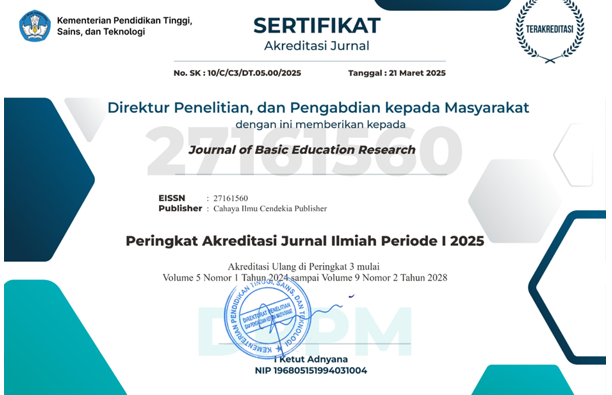Exploring Ethnopedagogy: Applying Ethnographic Studies in Thematic Learning in Elementary Schools
Abstract
Purpose of the Study: This research aims to examine how ethnopedagogy is implemented in thematic learning at MI Ma'arif Setono Jenangan Ponorogo, and analyze the impact of ethnopedagogy on the thematic learning outcomes of students at the institution. By integrating local wisdom into the curriculum, the study seeks to enhance educational quality while preserving cultural heritage.
Methodology: This study utilizes a qualitative ethnographic approach, gathering data through interviews, observations, and documentation. The analysis is conducted using domain analysis, taxonomic analysis, component analysis, and cultural theme analysis. These techniques allow for a detailed exploration of how local wisdom is woven into thematic learning.
Main Findings: The findings reveal that ethnopedagogy is incorporated into thematic learning by adapting the curriculum to include local cultural elements. Textbook materials are enriched with local wisdom related to values, norms, beliefs, arts, culture, and natural resources. This approach fosters a deeper connection between students and their cultural environment. Ethnopedagogy positively impacts students' thematic learning outcomes, with students from grades 1 to 6 consistently scoring above the Minimum Mastery Criteria. Additionally, ethnopedagogy enhances students' character development, promoting stronger nationalistic attitudes and a sense of responsibility toward preserving local culture.
Novelty/Originality of this Study: This study offers a fresh perspective on integrating local cultural values into primary education curricula. By demonstrating how ethnopedagogy can improve both academic performance and cultural awareness, the research provides a model for sustaining local heritage in the face of globalization, contributing to the broader discourse on culturally responsive education.
References
A. F. Gravina and M. Lanzafame, “Finance, globalisation, technology and inequality: Do nonlinearities matter?,” Econ. Model., vol. 96, no. November 2019, pp. 96–110, 2021, doi: 10.1016/j.econmod.2020.12.026.
H. Anadza and R. Utungga Pasopati, “Globalization, Islam Nusantara, and contemporary character empowerment,” J. Soc. Humanit. Educ., vol. 1, no. 2, pp. 79–89, 2021, doi: 10.35912/jshe.v1i2.372.
R. N. Helmi and F. Syafira, “Cultivating Students Nationalism Attitude in the era of globalization through civic education learning in Elementary School,” Int. J. Students Educ., vol. 1, no. 2, pp. 55–58, 2023.
A. Arpangi, “Political reform of labor protection law in the globalization era arpangi,” IJLR Int. J. Law Recontruction, vol. 4, no. 1, pp. 1–11, 2020.
F. A. Hidayat and M. G. R. Pandin, “Pancasila identity among millennial generation in the globalization era,” Preprints, no. June, pp. 1–14, 2021, doi: 10.20944/preprints202106.0321.v1.
F. N. I. Putri, “Pancasila moral values to build the nation in the era of globalization,” Int. J. Students Educ., vol. 2, no. 1, pp. 77–81, 2023.
E. S. Brondízio et al., “Locally based, regionally manifested, and globally relevant: Indigenous and Local Knowledge, values, and practices for nature,” Annu. Rev. Environ. Resour., vol. 46, no. 1, pp. 481–509, 2021, doi: 10.1146/annurev-environ-012220-012127.
Á. Fernández-Llamazares et al., “Scientists’ Warning to Humanity on Threats to Indigenous and Local Knowledge Systems,” J. Ethnobiol., vol. 41, no. 2, pp. 144–169, 2021, doi: 10.2993/0278-0771-41.2.144.
H. Ii, Z. Zulfitri, and T. S. Amin, “Stimulation of local cultural values and wisdom in the globalization era,” CENDEKIA J. Ilmu Sos. Bhs. dan Pendidik., vol. 3, no. 2, pp. 196–213, 2023.
N. Made and Y. Suranti, “The trend ethnopedagogy research as contribution in elementary science learning in the era of industrial revolution 4.0,” J. Ilm. Profesi Pendidik., vol. 9, no. 1, pp. 642–652, 2024.
Y. Yunita and N. Mufidah, “National defense education as students’ character education,” Int. J. Educ. Humanit., vol. 2, no. 4, pp. 147–156, 2022, doi: 10.58557/ijeh.v2i4.124.
I. Onishchuk et al., “Characteristics of foreign language education in foreign countries and ways of applying foreign experience in pedagogical Universities of Ukraine,” Rev. Rom. pentru Educ. Multidimens., vol. 12, no. 3, pp. 44–65, 2020, doi: 10.18662/rrem/12.3/308.
J. H. Hendrawan, “The inculcation of sundanese local wisdom values in millennial generation (Ethno-pedagogy on Social Studies Learning at the Pasundan Middle School, Cimahi),” in Proceedings of the International Conference On Social Studies, Globalisation And Technology (ICSSGT 2019), 2020, vol. 458, no. Icssgt 2019, pp. 307–314, doi: 10.2991/assehr.k.200803.038.
E. Yana, A. Anisah, and A. Yulianto, “Ethnopedagogical study of local wisdom values as a source of learning for forming economic behavior,” J. Innov. Educ. Cult. Res., vol. 4, no. 3, pp. 534–543, 2023, doi: 10.46843/jiecr.v4i3.910.
A. Sukhov, “Ethnopedagogical competence of students as a factor in the implementation of the ethnocultural education trend,” in SHS Web of Conferences, 2021, vol. 128, p. 05003, doi: 10.1051/shsconf/202112805003.
S. A. Sakti, S. Endraswara, and A. Rohman, “Revitalizing local wisdom within character education through ethnopedagogy apporach: A case study on a preschool in Yogyakarta,” Heliyon, vol. 10, no. 10, p. e31370, 2024, doi: 10.1016/j.heliyon.2024.e31370.
A. Gunardi, A. Muhyidin, S. M. Leksono, and U. Jamaludin, “Ethnopedagogy as an approach to primary education,” Cendikia Media J. Ilm. Pendidik., vol. 14, no. 6, pp. 654–661, 2024.
S. Hidayat, S. M. Leksono, U. Jamaludin, and S. Shintawati, “Ethno Pedagogy Approach in Preparing Science Learning in The Society 5.0 Era,” J. Penelit. Pendidik. IPA, vol. 9, no. 7, pp. 309–314, 2023, doi: 10.29303/jppipa.v9i7.4154.
I. Mialiawati, “the Effect of Globalization on Culture, Information Technology, and Education,” Proceeding ICTESS, vol. 2020, pp. 767–783, 2020.
J. Sibeoni et al., “A specific method for qualitative medical research: The IPSE (Inductive Process to analyze the Structure of lived Experience) approach. Application in child and adolescent psychiatry,” Neuropsychiatr. Enfance. Adolesc., vol. 69, no. 6, pp. 287–296, 2021, doi: 10.1016/j.neurenf.2021.07.005.
L. Busetto, W. Wick, and C. Gumbinger, “How to use and assess qualitative research methods,” Neurol. Res. Pract., vol. 2, no. 14, 2020, doi: 10.1186/s42466-020-00059-z.
L. H. Van Stekelenburg, D. De Ruyter, and W. Sanderse, “Equipping students with an ethical compass.’What does it mean, and what does it imply?. Ethics and Education, vol. 16, no. 1, pp. 91-107, 2021, doi: 10.1080/17449642.2020.1860315.
J. McKenzie, “Negotiating local and global values in a globalized world: The envisioned futures of Thai adolescents,” Journal of Research on Adolescence, vol. 30, no, 4, pp. 856-874, 2020, doi: 10.1111/jora.12567.
E. A. B. Elkorghli, “The impact of neoliberal globalisation on (global) citizenship teacher education in Norway,” Globalisation, Societies and Education, vol. 19, no. 5, pp. 610-624, 2021, doi: 10.1080/14767724.2021.1872369.
L. Wood, K. Swanson, and D. E. Colley III, “Tenets for a radical care ethics in geography,” ACME: An International Journal for Critical Geographies, vol. 19, no, 2, pp. 424-447, 2020, doi: 10.14288/acme.v19i2.1767.
J. Jimenez, L. Moorhead, and T. Wilensky, “‘It’s my responsibility’: perspectives on environmental justice and education for sustainability among international school students in Singapore,” International Studies in Sociology of Education, vol. 30, no. 1-2, pp. 130-152, 2021, doi: 10.1080/09620214.2020.1856000.
S. A. Sakti, S. Endraswara, and A. Rohman, “Revitalizing local wisdom within character education through ethnopedagogy apporach: A case study on a preschool in Yogyakarta,” Heliyon, vol. 10, no. 10, 2024, doi: 10.1016/j.heliyon.2024.e31370.
E. Yana, A. Anisah, and A. Yulianto, “Ethnopedagogical study of local wisdom values as a source of learning for forming economic behavior,” Journal of Innovation in Educational and Cultural Research, vol. 4, no. 3, pp. 534-543, 2023, doi: 10.46843/jiecr.v4i3.910.
O. M. Abdullah, P. Bundu, and A. Saman, “The fagogoru ethnopedagogy textbook development: A local learning resource for elementary schools in Central Halmahera,” International Journal of Integrative Sciences, vol. 3, no. 7, pp. 709-722, 2024, doi: 10.55927/ijis.v3i7.10585.
T. Nggaruaka, E. T. Priyatni, H. Suwignyo, and W. Siswanto, “Ethno-Pedagogical expressions in the Ndambu culture of the Kimaima community, Papua,” The Qualitative Report, vol. 28, no. 1, pp. 121-142, 2023, doi: 10.46743/2160-3715/2023.5771.
A. Azlan, N. Ismail, N. F. M. Fauzi, and R. A. Talib, “Playing traditional games vs. free-play during physical education lesson to improve physical activity: a comparison study,” Pedagogy of Physical Culture and Sports, vol. 25, no. 3, pp. 178-187, 2021, doi: 10.15561/26649837.2021.0306 .
S. Munir, and M. Zaheer, “The role of extra-curricular activities in increasing student engagement,” Asian Association of Open Universities Journal, vol. 16, no. 3, pp. 241-254, 2021, doi: 10.1108/AAOUJ-08-2021-0080.
K. Kamid., W. Syafmen, N. Fajriah, Y. D. Citra, P. A. Rivani, and R. I. Widodo, “Investigating the role of traditional games in developing students' process skills and interest in learning mathematics,” Eurasian Journal of Educational Research, vol. 97, pp. 216-234, 2022, doi: 10.14689/ejer.2022.97.12.
Copyright (c) 2024 Indira Nursima, Sairan Mohammed Rashid, Dribrahim Abozaid

This work is licensed under a Creative Commons Attribution 4.0 International License.
Authors who publish with this journal agree to the following terms:
- Authors retain copyright and acknowledge that the Journal of Basic Education Research is the first publisher licensed under a Creative Commons Attribution 4.0 International License.
- Authors are able to enter into separate, additional contractual arrangements for the non-exclusive distribution of the journal's published version of the work (e.g., post it to an institutional repository or publish it in a book), with an acknowledgment of its initial publication in this journal.
- Authors are permitted and encouraged to post their work online (e.g., in institutional repositories or on their website) prior to and during the submission process, as it can lead to productive exchanges and earlier and greater citation of published work.





.png)


.png)
.png)


















